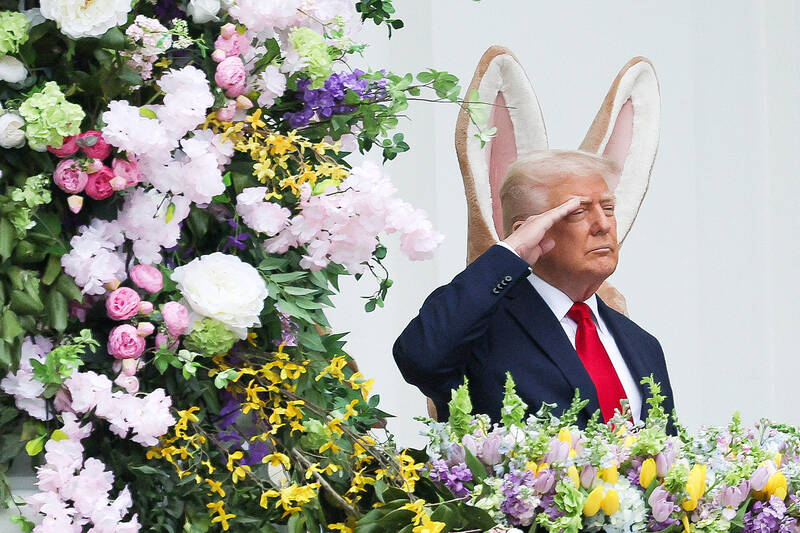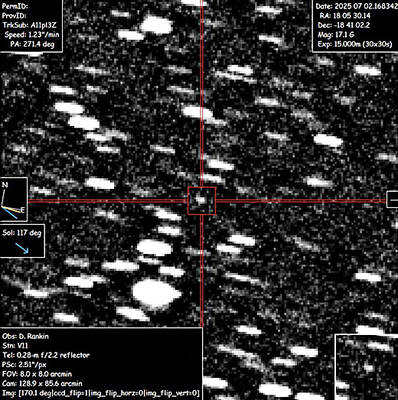US President Donald Trump’s public approval rating edged down to its lowest level since his return to the White House, as Americans showed signs of wariness over his efforts to broaden his power, a Reuters/Ipsos poll that closed on Monday found.
About 42 percent of respondents to the six-day poll approved of Trump’s performance as president, down from 43 percent in a Reuters/Ipsos poll conducted three weeks earlier, and from 47 percent in the hours after his Jan. 20 inauguration.
The start of Trump’s term has left his political opponents stunned, as he has signed dozens of executive orders expanding his influence over government departments as well as private institutions, such as universities and law firms.

Photo: Reuters
While Trump’s approval rating remains higher than the ratings seen during most of his Democratic predecessor’s presidency, the results of the Reuters/Ipsos poll suggest many Americans are uncomfortable with his moves to punish universities he sees as too liberal and to install himself as the board chair of the Kennedy Center, a major theater and cultural institution in Washington.
About 83 percent of the 4,306 respondents said that the US president must obey federal court rulings even if he does not want to. Trump administration officials could face criminal contempt charges for contravening a federal judge’s order halting deportations of alleged members of a Venezuelan gang who had no chance to challenge their removals.
Fifty-seven percent — including one-third of Republicans — disagreed with the statement that “it’s okay for a US president to withhold funding from universities if the president doesn’t agree with how the university is run.”
Trump, who has said universities are failing to fight anti-Semitism on campus, has frozen vast sums of federal money budgeted for US universities, including more than US$2 billion for Harvard University alone.
A similar share of respondents — 66 percent — said they did not think the president should be in control of premier cultural institutions such as national museums and theaters.
Trump last month ordered the Smithsonian Institution, the vast museum and research complex that is a premier exhibition space for US history and culture, to remove “improper” ideology.
On a range of issues, from inflation and immigration to taxation and rule of law, the Reuters/Ipsos poll showed that Americans who disapproved of Trump’s performance outnumbered those who approved on every issue in the poll. On immigration, his strongest area of support, 45 percent of respondents approved of Trump’s performance, but 46 percent disapproved.
The poll had a margin of error of about 2 percentage points.
About 59 percent of respondents — including a third of Republicans — said the US was losing credibility on the global stage.
Three-quarters of respondents said Trump should not run for a third term in office —— a path Trump has said he would like to pursue, although the US Constitution bars him from doing so.
A majority of Republican respondents — 53 percent — said Trump should not seek a third term.

Two former Chilean ministers are among four candidates competing this weekend for the presidential nomination of the left ahead of November elections dominated by rising levels of violent crime. More than 15 million voters are eligible to choose today between former minister of labor Jeannette Jara, former minister of the interior Carolina Toha and two members of parliament, Gonzalo Winter and Jaime Mulet, to represent the left against a resurgent right. The primary is open to members of the parties within Chilean President Gabriel Boric’s ruling left-wing coalition and other voters who are not affiliated with specific parties. A recent poll by the

TENSIONS HIGH: For more than half a year, students have organized protests around the country, while the Serbian presaident said they are part of a foreign plot About 140,000 protesters rallied in Belgrade, the largest turnout over the past few months, as student-led demonstrations mount pressure on the populist government to call early elections. The rally was one of the largest in more than half a year student-led actions, which began in November last year after the roof of a train station collapsed in the northern city of Novi Sad, killing 16 people — a tragedy widely blamed on entrenched corruption. On Saturday, a sea of protesters filled Belgrade’s largest square and poured into several surrounding streets. The independent protest monitor Archive of Public Gatherings estimated the

Irish-language rap group Kneecap on Saturday gave an impassioned performance for tens of thousands of fans at the Glastonbury Festival despite criticism by British politicians and a terror charge for one of the trio. Liam Og O hAnnaidh, who performs under the stage name Mo Chara, has been charged under the UK’s Terrorism Act with supporting a proscribed organization for allegedly waving a Hezbollah flag at a concert in London in November last year. The rapper, who was charged under the anglicized version of his name, Liam O’Hanna, is on unconditional bail before a further court hearing in August. “Glastonbury,

FLYBY: The object, appears to be traveling more than 60 kilometers per second, meaning it is not bound by the sun’s orbit, astronomers studying 3I/Atlas said Astronomers on Wednesday confirmed the discovery of an interstellar object racing through the solar system — only the third-ever spotted, although scientists suspect many more might slip past unnoticed. The visitor from the stars, designated 3I/Atlas, is likely the largest yet detected, and has been classified as a comet, or cosmic snowball. “It looks kind of fuzzy,” said Peter Veres, an astronomer with the International Astronomical Union’s Minor Planet Center, which was responsible for the official confirmation. “It seems that there is some gas around it, and I think one or two telescopes reported a very short tail.” Originally known as A11pl3Z before